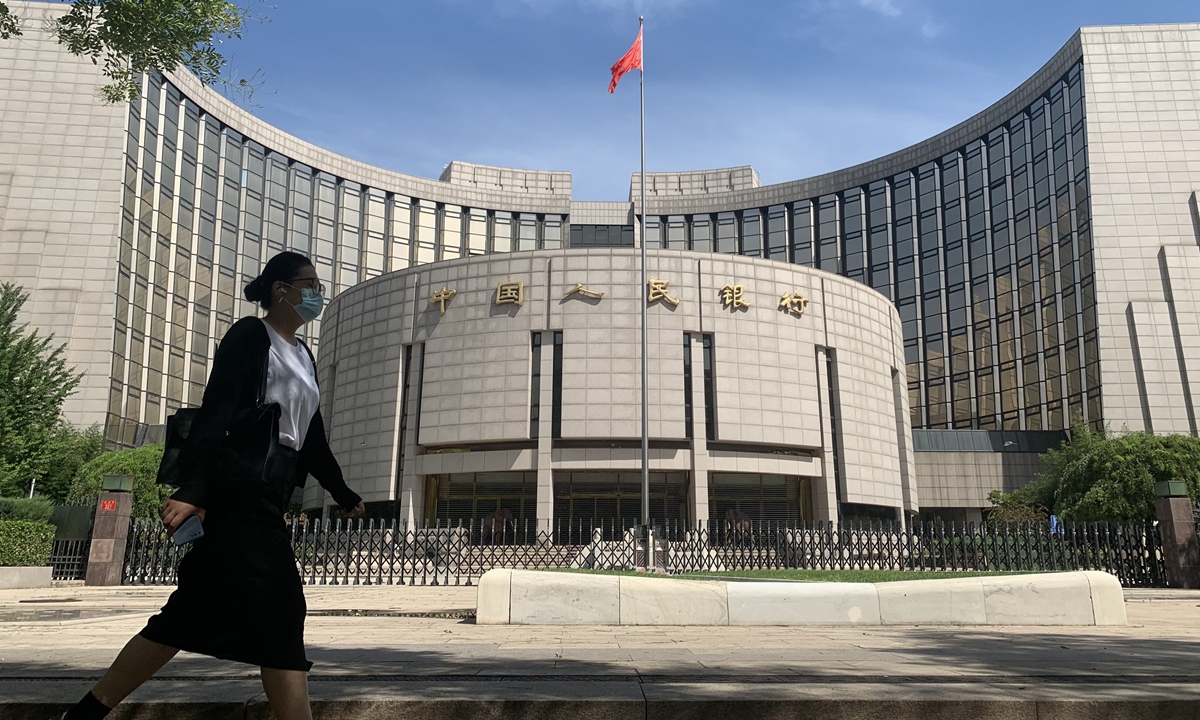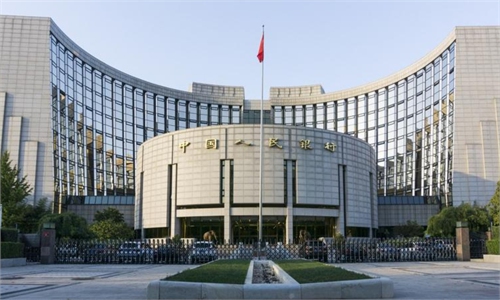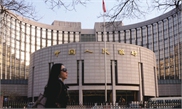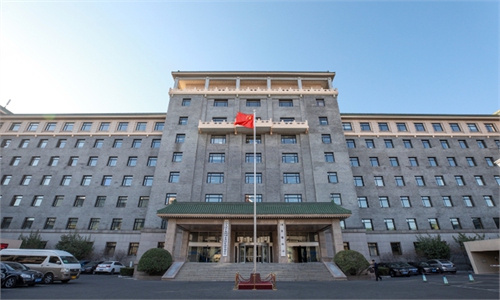PBC announces 20 bps reduction in one-year MLF to boost liquidity, economic recovery
Rate cuts to provide support for reaching annual GDP target: experts

A view of the PBC building in Beijing Photo: VCG
China's central bank conducted a medium-term lending facility (MLF) operation reducing rates on Thursday, marking the second rate cut within one week.
This move is aimed at increasing liquidity and bolstering the economic recovery. It also shows that policymakers are swiftly increasing the use of various tools to achieve the goals set for this year's economic and social development, as highlighted in a key reform-themed meeting, experts said.
The People's Bank of China (PBC) issued 200 billion yuan ($27.5 billion) in one-year loans through its MLF at a rate of 2.30 percent, which was 20 basis points (bps) lower than the previous loan rate, according to the bank's website.
The central bank also injected 235.1 billion yuan into the markets through seven-day reverse repos at a rate of 1.70 percent, a move intended to ensure that there is sufficient liquidity in the banking system at the end of the month, the PBC said.
The operation comes after the central bank cut several benchmark lending rates on Monday, just days after the third plenary session of the 20th Communist Party of China Central Committee, which had outlined major reforms.
"It was highlighted that we must remain firmly committed to accomplishing the goals for this year's economic and social development," according to the Communique of the third plenum.
The one-year loan prime rate (LPR) came in at 3.35 percent on Monday, down from the previous reading of 3.45 percent, according to the National Interbank Funding Center.
The over-five-year LPR, on which many lenders base their mortgage rates, was lowered by 10 bps to 3.85 percent.
These moves show that the PBC has significantly increased its monetary policy measures. The recent rate reductions will help maintain reasonable liquidity in the market, lower financing costs for businesses and stimulate effective demand, which is essential for sustainable growth, experts said.
"The central bank's interest rate cuts send a signal of monetary policy easing, increased efforts of counter-cyclical adjustment and stronger support for achieving the annual economic growth target," Wu Chaoming, deputy head of the Chasing Research Institute, told the Global Times on Thursday.
It allows market participants to see the direction and strength of the policy, as well as the pro-growth attitude of policymakers, which helps restore market confidence and expectations, Wu said.
"By conducting the MLF operation this month, the central bank is guiding financial institutions to provide long-term, low-cost funding to support the real economy. This is a significant increase in financial support for the real economy, particularly in weak areas and key sectors," Zhou Maohua, an economist at China Everbright Bank, told the Global Times on Thursday.
The stepped-up monetary policy is supporting the consumption recovery and domestic circulation, and it will promote the economic recovery and help stabilize prices, Zhou added.
Also on Thursday, some major state-owned banks including the Industrial and Commercial Bank of China, Agricultural Bank of China, China Construction Bank, Bank of China and Bank of Communications cut deposit rates by 5-20 bps, their first cuts in deposit rates this year.
Optimizing deposit interest rates is beneficial for stabilizing a bank's cost of liabilities and promoting investment and consumption by businesses and consumers, experts said.
The reduction of deposit interest rates will help banks lower their interest expenses, providing financial institutions with more room to pass on benefits to the real economy, Zhou said.
Experts remain optimistic that China can achieve its economic growth target of 5 percent this year and continue to inject momentum into the world economy.
China's economic growth rate is expected to reach around 5 percent in the second half of the year, and as a result, the economy is expected to achieve its pre-set annual target. This year, China's contribution to the world economy may still remain at a high level, making the economy a main engine for global economic recovery, Li Xuesong, director of the Institute of Quantitative and Technological Economics, Chinese Academy of Social Sciences, told the Global Times.
In the first half of the year, the economy grew 5 percent year-on-year, showing a stable foundation. Several international organizations, including the IMF and World Bank, have raised their forecasts for China's economic growth.



